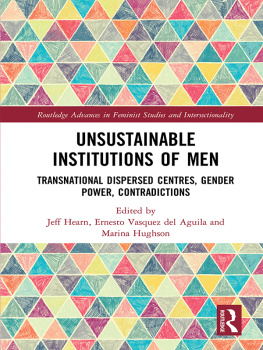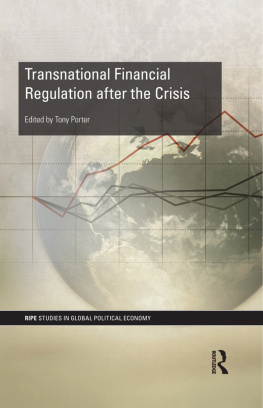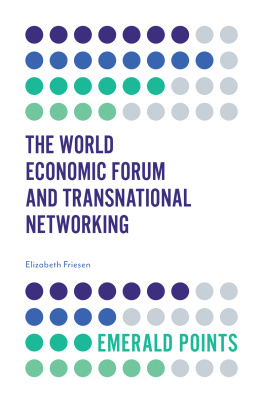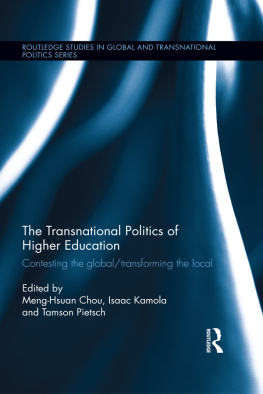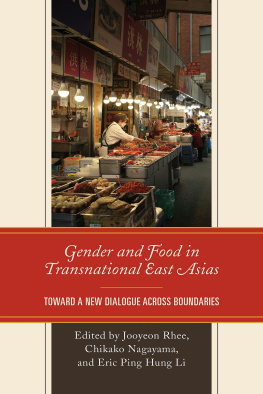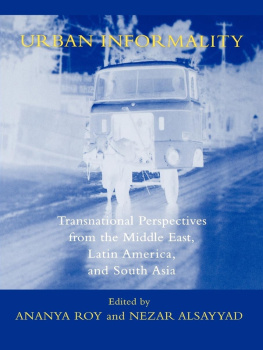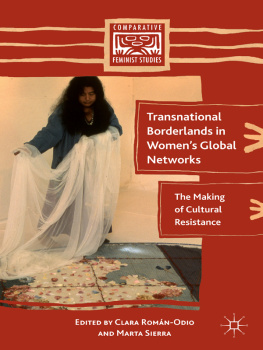Frederick M. Shepherd has driven the literature forward in Latin American Politics by filling a gap on the influence of transnational actors. Shepherds three levels of analysis (societal, national, and transnational) provide a nuanced 20,000-foot view of the region and the influence, or lack thereof, of transnational actors His coverage is comprehensive yet succinct, stretching from early drug prohibitionist history to the modern drug war in Latin America and current administrations [The book] introduces an important analytical variable of state infrastructural capacity which, when low, weakens Latin American governments ability to address societal needs broadly.
Nathan P. Jones, Associate Professor of Security Studies, Sam Houston State University, USATHE POLITICS OF TRANSNATIONAL ACTORS IN LATIN AMERICA
The Politics of Transnational Actors in Latin America: Power from Afar explores the important issues of transnational actors and their influence on institutions and people in Latin America, raising profound questions of accountability, social justice, and sovereignty.
The text focuses on four particularly significant groups that transcend national boundaries: the Catholic Church, transnational corporations, transnational drug networks, and transnational human rights networks. By comparing each of their impacts on the region, Frederick M. Shepherd explores larger questions about transnational power and how it has deeply penetrated the nations of Latin America. The books analysis delves into attempts made over the last 100 years by citizens, social movements, and governments to reassert a degree of control over these transnational actors, setting up a framework to understand how local, national, and global forces interact in a setting of transnational dominance. The volume suggests that local and national groups can use principles and power to bring about equitable and just outcomes in relation to transnational actors, and that, in some cases, transnational actors can be a part of constructive change in Latin America.
This concise volume will be of interest to students of History, Latin American and Caribbean Studies, and Political Science as well as those interested in 20th-century Latin American politics and political history.
Frederick M. Shepherd is Professor of Political Science at Samford University, USA. He is the editor of Christianity and Human Rights: Christians and the Struggle for Global Justice and the author of numerous publications on Latin American politics, religion, human rights, and genocide.
First published 2021
by Routledge
52 Vanderbilt Avenue, New York, NY 10017
and by Routledge
2 Park Square, Milton Park, Abingdon, Oxon OX14 4RN
Routledge is an imprint of the Taylor & Francis Group, an informa business
2021 Taylor & Francis
The right of Frederick M. Shepherd to be identified as author of this work has been asserted by him in accordance with sections 77 and 78 of the Copyright, Designs and Patents Act 1988.
All rights reserved. No part of this book may be reprinted or reproduced or utilised in any form or by any electronic, mechanical, or other means, now known or hereafter invented, including photocopying and recording, or in any information storage or retrieval system, without permission in writing from the publishers.
Trademark notice: Product or corporate names may be trademarks or registered trademarks, and are used only for identification and explanation without intent to infringe.
Library of Congress Cataloging-in-Publication Data
Names: Shepherd, Frederick M., 1963 author.
Title: The politics of transnational actors in Latin America : power from afar / Frederick M. Shepherd.
Description: New York, NY : Routledge, 2021. | Includes bibliographical references and index.
Identifiers: LCCN 2020043912 (print) | LCCN 2020043913 (ebook) |
ISBN 9781138096325 (hardback) | ISBN 9781138096332 (paperback) |
ISBN 9781003017998 (ebook)
Subjects: LCSH: Non-state actors (International relations)Latin
America. | Transnationalism. | Latin AmericaPolitics and government.
Classification: LCC JL960 .S53 2021 (print) |
LCC JL960 (ebook) | DDC 320.98dc23
LC record available at https://lccn.loc.gov/2020043912
LC ebook record available at https://lccn.loc.gov/2020043913
ISBN: 978-1-138-09632-5 (hbk)
ISBN: 978-1-138-09633-2 (pbk)
ISBN: 978-1-003-01799-8 (ebk)
Typeset in Bembo
by codeMantra
The general idea for this book began several decades back, during work on my dissertation at Georgetown University. As a result, Id like to thank George Crane, Eusebio Mujal-Len, Arturo Valenzuela, and especially John Bailey for their practical and theoretical guidance as I made my way through my initial attempt at understanding the drama of Latin America through the lens of a three-level framework of analysis. Id also like to thank several scholars and colleagues from my many years at Samford University, with whom Ive discussed these and related matters: James Brown, Carlos Alemn, and Serena Simoni. James Waller and John Witte have provided me with great insight into issues of genocide and religion. I am especially eager to go on record posthumously thanking someone who helped me throughout the years and who always seems to appear in acknowledgments: the great Charles Tilly, whose influence is seen directly or indirectly in so many important works. Im also particularly grateful to distinguished economist William G. Shepherd for his insights on corporate power (and his steadfast support as a parent) over the years.
More recently, I have had the chance to communicate about this book directly with a number of gracious and insightful folks: thanks to Miguel Angel Centeno; Alison Brysk; Nathan Jones; Jackie Smith; and, once again, John Bailey. Thanks as well to Cecilia Plottier at the UN Economic Commission for Latin America in Santiago, Chile, and Lauren Young at the Samford University Library for research assistance. Id also like to thank several people for key technical support: my wife, Lorrin Etka-Shepherd, for help with the tables; Lee Walsh at the Samford Department of Political Science for countless instances of help; my colleague Scott Fisk for his help with the graphics; and my daughter Maddie Shepherd for computer assistance during crises. Many thanks also to Emily Irvine at Routledge/Taylor and Francis for her fine work in helping to get through this lengthy process.
On a more personal level, Id like to thank my family for all their support during this project and many others. The unit weve put together, which is now growing with a new generation, is far more important than anything I put into written form. So, in this spirit, final and heartfelt thanks (again) to my wonderful wife Lorri. Im grateful for her patience with me always, and especially as the deadline for the book neared. And theres no one Id rather be with during a pandemic!
1
The Politics of Transnational Actors in Latin America
Transnational actors deeply influence the daily lives of the Latin American people, from the northern border of Mexico to the Southern Cone. Organizations based in distant lands make decisions that affect how Latin Americans work, consume, worship, and mobilize politically. They have deeply penetrated Latin American political systems, controlling national governments and directly influencing Latin American societies. Yet, even as transnational actors have thwarted states and citizens in the region, their presence has provided openings for Latin Americans to empower themselves in an increasingly globalized setting. This book focuses on four especially influential transnational actors: the Catholic Church, transnational corporations (TNCs), transnational drug networks (TDNs), and transnational human rights networks (THRNs). Their global scope allows them to transcend national boundaries and mobilize vast resources. These transnational actors have cajoled, bullied, collaborated with, and frequently superseded national governments as they have exerted their influence on the people, the political systems, the culture, the religion, and the economies of Latin America. In doing so, they have raised profound questions of sovereignty, democracy, and self-determination in Latin America.



